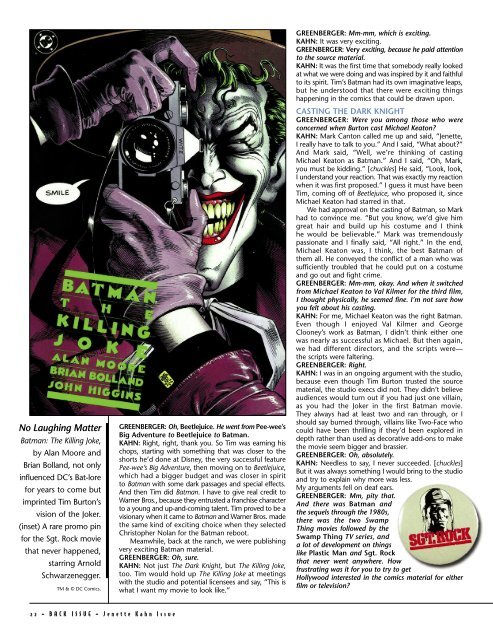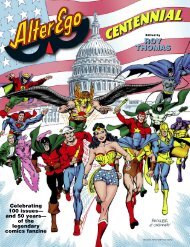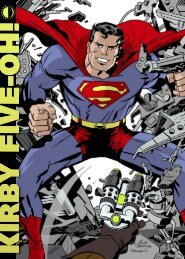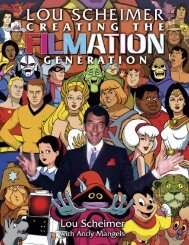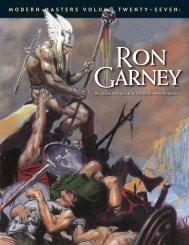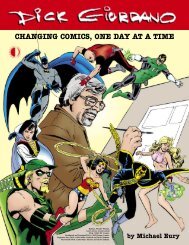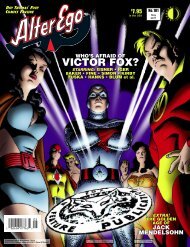JENETTE KAHN - TwoMorrows Publishing Store
JENETTE KAHN - TwoMorrows Publishing Store
JENETTE KAHN - TwoMorrows Publishing Store
Create successful ePaper yourself
Turn your PDF publications into a flip-book with our unique Google optimized e-Paper software.
No Laughing Matter<br />
Batman: The Killing Joke,<br />
by Alan Moore and<br />
Brian Bolland, not only<br />
influenced DC’s Bat-lore<br />
for years to come but<br />
imprinted Tim Burton’s<br />
vision of the Joker.<br />
(inset) A rare promo pin<br />
for the Sgt. Rock movie<br />
that never happened,<br />
starring Arnold<br />
Schwarzenegger.<br />
TM & © DC Comics.<br />
GREENBERGER: Oh, Beetlejuice. He went from Pee-wee’s<br />
Big Adventure to Beetlejuice to Batman.<br />
<strong>KAHN</strong>: Right, right, thank you. So Tim was earning his<br />
chops, starting with something that was closer to the<br />
shorts he’d done at Disney, the very successful feature<br />
Pee-wee’s Big Adventure, then moving on to Beetlejuice,<br />
which had a bigger budget and was closer in spirit<br />
to Batman with some dark passages and special effects.<br />
And then Tim did Batman. I have to give real credit to<br />
Warner Bros., because they entrusted a franchise character<br />
to a young and up-and-coming talent. Tim proved to be a<br />
visionary when it came to Batman and Warner Bros. made<br />
the same kind of exciting choice when they selected<br />
Christopher Nolan for the Batman reboot.<br />
Meanwhile, back at the ranch, we were publishing<br />
very exciting Batman material.<br />
GREENBERGER: Oh, sure.<br />
<strong>KAHN</strong>: Not just The Dark Knight, but The Killing Joke,<br />
too. Tim would hold up The Killing Joke at meetings<br />
with the studio and potential licensees and say, “This is<br />
what I want my movie to look like.”<br />
GREENBERGER: Mm-mm, which is exciting.<br />
<strong>KAHN</strong>: It was very exciting.<br />
GREENBERGER: Very exciting, because he paid attention<br />
to the source material.<br />
<strong>KAHN</strong>: It was the first time that somebody really looked<br />
at what we were doing and was inspired by it and faithful<br />
to its spirit. Tim’s Batman had its own imaginative leaps,<br />
but he understood that there were exciting things<br />
happening in the comics that could be drawn upon.<br />
CASTING THE DARK KNIGHT<br />
GREENBERGER: Were you among those who were<br />
concerned when Burton cast Michael Keaton?<br />
<strong>KAHN</strong>: Mark Canton called me up and said, “Jenette,<br />
I really have to talk to you.” And I said, “What about?”<br />
And Mark said, “Well, we’re thinking of casting<br />
Michael Keaton as Batman.” And I said, “Oh, Mark,<br />
you must be kidding.” [chuckles] He said, “Look, look,<br />
I understand your reaction. That was exactly my reaction<br />
when it was first proposed.” I guess it must have been<br />
Tim, coming off of Beetlejuice, who proposed it, since<br />
Michael Keaton had starred in that.<br />
We had approval on the casting of Batman, so Mark<br />
had to convince me. “But you know, we’d give him<br />
great hair and build up his costume and I think<br />
he would be believable.” Mark was tremendously<br />
passionate and I finally said, “All right.” In the end,<br />
Michael Keaton was, I think, the best Batman of<br />
them all. He conveyed the conflict of a man who was<br />
sufficiently troubled that he could put on a costume<br />
and go out and fight crime.<br />
GREENBERGER: Mm-mm, okay. And when it switched<br />
from Michael Keaton to Val Kilmer for the third film,<br />
I thought physically, he seemed fine. I’m not sure how<br />
you felt about his casting.<br />
<strong>KAHN</strong>: For me, Michael Keaton was the right Batman.<br />
Even though I enjoyed Val Kilmer and George<br />
Clooney’s work as Batman, I didn’t think either one<br />
was nearly as successful as Michael. But then again,<br />
we had different directors, and the scripts were—<br />
the scripts were faltering.<br />
GREENBERGER: Right.<br />
<strong>KAHN</strong>: I was in an ongoing argument with the studio,<br />
because even though Tim Burton trusted the source<br />
material, the studio execs did not. They didn’t believe<br />
audiences would turn out if you had just one villain,<br />
as you had the Joker in the first Batman movie.<br />
They always had at least two and ran through, or I<br />
should say burned through, villains like Two-Face who<br />
could have been thrilling if they’d been explored in<br />
depth rather than used as decorative add-ons to make<br />
the movie seem bigger and brassier.<br />
GREENBERGER: Oh, absolutely.<br />
<strong>KAHN</strong>: Needless to say, I never succeeded. [chuckles]<br />
But it was always something I would bring to the studio<br />
and try to explain why more was less.<br />
My arguments fell on deaf ears.<br />
GREENBERGER: Mm, pity that.<br />
And there was Batman and<br />
the sequels through the 1980s,<br />
there was the two Swamp<br />
Thing movies followed by the<br />
Swamp Thing TV series, and<br />
a lot of development on things<br />
like Plastic Man and Sgt. Rock<br />
that never went anywhere. How<br />
frustrating was it for you to try to get<br />
Hollywood interested in the comics material for either<br />
film or television?<br />
2 2 • B A C K I S S U E • J e n e t t e K a h n I s s u e


